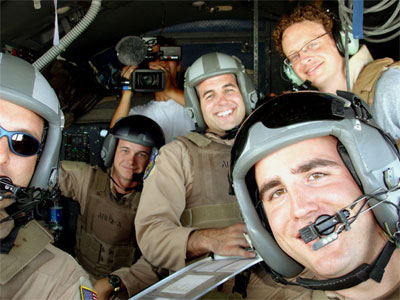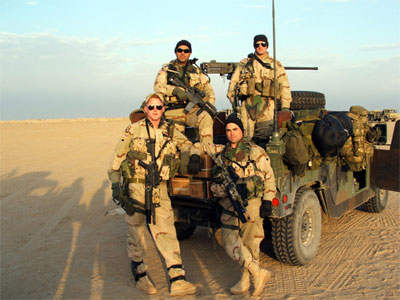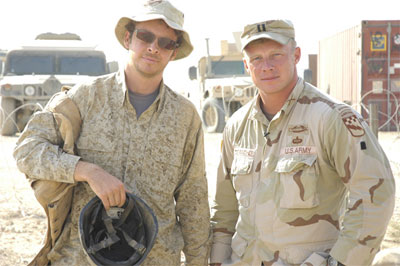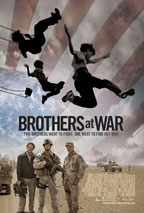Gary Sinise Brothers at War Interview

SINISE GOES TO WAR.
Exclusive Gary Sinise, Brothers at War Interview by Paul Fischer.While audiences may know Gary Sinise as either one of the stars of the classic Forrest Gump, or as star of CSI New York, the acclaimed actor has turned his attention to producing a low-budget compelling documentary that offers a unique perspective on war and family. Brothers at War is an intimate portrait of an American family during a turbulent time. Jake Rademacher sets out to understand the experience, sacrifice, and motivation of his two brothers serving in Iraq. The film follows Jakes exploits as he risks everything, including his life to tell his brothers story. The film provides a rare look at the bonds and service of our soldiers on the frontlines and the profound effects their service has on the loved ones they leave behind. Sinise explained his rationale for getting behind this special film to Paul Fischer in this exclusive interview.
QUESTION: I guess the obvious question to start off with is, it's not necessarily the kind of film we expect you to have been involved with as an executive producer. So I'm just wondering how this - if it's a story that you became aware of? Did the brothers come to you? How did you become involved in this?
GARY SINISE: Yeah. It was a buddy of mine who actually introduced me to Jake Rademacher, who made the movie. And this buddy of mine knew Jake, and he knew me, and he thought - Jake was having trouble figuring out how to get the movie distributed, and get it out there. He had shot it, and edited it, and it was so - a little bit rough. But it was nearly finished. And then, where do you go? You know. He was out of money, and had no distributor. So this buddy hooked him up with me, and Jake showed me the movie, and I wanted to do what I could to draw some attention to the movie. So I started hosting some screenings, and bringing people together to see it, and introducing Jake to various people that I knew that might be able to help, you know, get distribution on the film. And then he asked me to come aboard as Executive Producer, which I did, because I believe in the film and wanted to help support it. And then Samuel Goldwyn jumped on board, and the movie has opened all around the country, and just now in Los Angeles.
QUESTION: There have been so many films that explore the nature of war, and this war in particular. What do you think it is about - about this one, that makes it - gives it a unique perspective, in your view?
GARY SINISE: I think it's the fact that what makes it unique is that it's made by a brother, about his two brothers. Jake wasn't a journalist, or somebody was hired to go over and - you know, find out what was going on in Iraq. He's a guy who was worried about his brothers, wanted to - you know. Had a lot of pride in them for serving, and wanted to know more about what they were doing. And so he raised the money, and got a camera crew together, and was able to embed with some units over there that are serving with his brothers, and find out what was going on.
QUESTION: Do you think the time is right for this film? Or do you think it would have been just as appropriate both politically and socially to release the film during the latter days of the Bush Administration?
GARY SINISE: No. it doesn't really matter about that. This is a personal film, and it shows what our - you know, what our troops are doing. But it's told through a very personal - you know, with a very personal agenda. It's not a political agenda, or anything like that. This - you know, Jake's old - the younger - these are his two younger brothers, that are serving in the military. And the older of the two brothers had just had a baby. And then he gets deployed to Iraq. So Jake was like, "Well, what if something happens to him? This baby's never gonna know his father, or her father." And Jake was concerned about that. And that got him thinking, "Well, maybe I can go over there, and see what's going on, and take some cameras, and find out what his brothers are doing, why they're serving, and document some of that stuff." And so this is a very, very personal movie.
 QUESTION: It is a film about family. It is a film about an American family. Did you offer any assistance in terms of the way that it needed to have a narrative through-line, in order to get an audience interested?
QUESTION: It is a film about family. It is a film about an American family. Did you offer any assistance in terms of the way that it needed to have a narrative through-line, in order to get an audience interested? GARY SINISE: No, I didn't. I made a few suggestions here and there, for little things. But the movie, when I saw it, was - you know, very complete. And had been worked on for quite a while. They had just run out of money, and weren't sure where to go from there.
QUESTION: What did working on a tiny film like this as an executive producer teach you about the nature of the film industry?
GARY SINISE: Well, I mean, any movie that gets made and gets into the theatres is - you know, it's fortune. Because the odds are against you. It's very expensive, and getting distribution is very difficult. And certainly for a documentary, it's almost impossible. I mean, how many documentaries do you see every year in the theatres? You can count `em on one hand, maybe, if you're lucky. So, we all feel very, very fortunate that we were able to first - you know, that Jake was able to make the movie. Get the money to get the movie shot and edited and finished. And then fortunate to find a distributor that was willing to go with the movie and put it out there. The unfortunate part about it is that there is very little advertising budget. There's almost no advertising budget for this movie at all. We were able to get distribution, get it into the theatres, but there's no money to promote the movie. We're depending a lot on word of mouth, on grass roots efforts around the country, on the free press that we get like I'm doing right here today, to get the word out, and let people know that they can go to Brothersatwarmovie.com, to see where the movie's playing. You can even arrange - if you can sell 1000 tickets in your community, you can - you know, Samuel Goldwyn will send you a print, and you can get it going in your own community, if it's a movie you believe in, and want to see. The movie's done quite well, in a bunch of different military communities. It opened in New York last week and just now in Los Angeles. For a documentary, we've done real well, and we're proud that we were able to get the movie into the theatres. Because it opened in New York and Los Angeles, it'll qualify for Academy Award consideration. I think in the long run, it'll be on DVD and television, so a lot of people are going to see this film that might not have had the opportunity, if we hadn't got this distribution going.
QUESTION: What do you hope audiences will get out of seeing this film? I mean, it's not really a film as much about war, as it is about the impact of war on those who are not directly involved in it. Is that what you think sets this film apart from a lot of documentaries about -
 GARY SINISE: Well, as I said, it's a very personal look. So, that's one of the things that sets it about. I mean, it's - you know, the brother who's making the movie is in the movie. He's on camera, as well as behind the camera. So, he's in the movie, and he's interacting with his brothers, and he's interacting with those that his brothers are serving with. It's an interesting story, because - you know, in the very beginning of the film, he doesn't know what he's doing. He's trying to piece things together, and get over there, and he doesn't know what to expect. By the end of the film, he learns a lot about himself, and a lot about his brothers, and a lot about those who serve in the military, and who they are.
GARY SINISE: Well, as I said, it's a very personal look. So, that's one of the things that sets it about. I mean, it's - you know, the brother who's making the movie is in the movie. He's on camera, as well as behind the camera. So, he's in the movie, and he's interacting with his brothers, and he's interacting with those that his brothers are serving with. It's an interesting story, because - you know, in the very beginning of the film, he doesn't know what he's doing. He's trying to piece things together, and get over there, and he doesn't know what to expect. By the end of the film, he learns a lot about himself, and a lot about his brothers, and a lot about those who serve in the military, and who they are. QUESTION: His access was pretty extraordinary. I mean, he was able to get some really amazing footage.
GARY SINISE: Amazing stuff, that we've never seen before. I mean, at the end of the film, he goes out on patrol with an Iraqi unit, that are patrolling out there. And they get attacked, and he's right in the middle of this thing, and the Iraqis are fighting back, and the Marines are proud of the Iraqis for standing up. And - you know. They're being trained by our Marines, but they're taking the lead in the fight, and they get attacked by some bad guys. And they're fighting `em off. And you've never seen an Iraqi unit in battle before, like this. I mean, this is a first. And this is done by - you know, an actor who had a camera. I mean, he left his camera crew back at the base, because they had to go real quick. So he just grabbed a camera, and jumped in the Humvee and went with the Marines out to meet with the Iraqi unit. And all of a sudden, the Iraqi unit gets attacked. And he's right in the thick of it. We've never seen footage like that. And it's pretty interesting, because you can really see the pride that the Iraqis have in how they handled themselves that day, and the pride that the Marines have in the Iraqis they're working with, and training, and the love that they have for each other. It's heartwarming, and it shows you a side of what's going on in Iraq that we just don't hear enough about. That there are Iraqis out there that are struggling, and suffering, who want things to work out. Who want to live in freedom. Who want to defend themselves. And you get to see that here, in this film.
QUESTION: Now, you began producing at a time when nobody really knew who you were. And you managed to - in fact, the first time I interviewed you, when I was still living in Australia, was for Of Mice and Men.
GARY SINISE: Oh, yeah, sure. And that's back in the early '90s.
QUESTION: How much have you learned about yourself as well as a filmmaker and as an actor, in the last - you know, over the last decade?
GARY SINISE: Well, I think - you know, a lot of things have changed over the years, you know? I mean, I've got a lot more experience in doing a lot of different types of things. But I have to tell you, when this country was attacked on September 11th, a lot of things changed for me. I just all of a sudden felt very vulnerable, like so many of us did. And wanted to do more. So, I just jumped into a whole level of service that I hadn't done before. I'd been involved with our veterans for many years, and involved with our disabled veterans. I got involved with them after Forrest Gump. But - you know, I have Vietnam veterans in my family. And then when we got attacked on 9/11, we started deploying troops to Afghanistan and Iraq, and they started getting hurt. I just - I couldn't sit back and do nothing. And so I just started volunteering to go out there and make sure that they knew that they were cared about, and they were appreciated. And I remember all too well what it was like for our Vietnam veterans to return home from war, and to be treated terribly when they got home. And I just couldn't bear to think that something like that would happen again, that we would send our troops to Iraq and Afghanistan, and then have `em come home and get spit at, or - you know, something bad happen to them. They're volunteers, and they're out there, and their families are suffering and struggling. And they need to know that they're appreciated. It's a dangerous world out there. I don't know it's going to get less dangerous as time goes on. It's gonna probably get more dangerous. And - you know, our volunteer defenders are gonna be called upon. And we just should keep them strong.
QUESTION: Are you optimistic, even with the change of Administrations, that things will be different as far as veterans are concerned?
GARY SINISE: Well, you know, as far as - it's better for our veterans now, than maybe 30 years ago, where they were completely forgotten. Now, there are a lot of grass roots organizations that are focused on supporting our veterans, and trying to do things for `em and take care of `em. I'm involved with various organizations that are really trying to help our wounded, and help their families.

Brothers at War
Starring: Jake Rademacher, Isaac Rademacher, Joseph RademacherDirector: Jake Rademacher
Genre: Action/Adventure
Filmmaker Jake Rademacher gets rare access to American and Iraqi troops in this gripping documentary. For BROTHERS AT WAR, Rademacher chronicles the experiences of his two soldier siblings as they... Filmmaker Jake Rademacher gets rare access to American and Iraqi troops in this gripping documentary. For BROTHERS AT WAR, Rademacher chronicles the experiences of his two soldier siblings as they serve in the Middle East, tracking them from their missions in Iraq to their journeys home, giving him a detailed picture of what life as a soldier is like.
MORE
- Viggo Mortensen The Road
- 24 Cast Reunion
- Aaron Eckhardt No Reservations
- Aaron Eckhart The Dark Knight
- Adam McKay Step Brothers Interview
- Alan Alda Diminished Capacity Interview
- Alan Alda Diminished Capacity Interview
- Alex Dimitriades
- Al Pacino Oceans 13
- Alan Rickman Snow Cake
- Alan Rickman Sweeney Todd



